#chinese american literature
Text

"Likes" is available to read here
#short stories#short story#likes#sarah shun-lien bynum#chinese american literature#asian american literature#american literature#21st century literature#english language literature#have you read this short fiction?#book polls#completed polls#links to text
11 notes
·
View notes
Text
I asked the wilderness to build me back up, though it was foolish, because who can trust the wilderness? Who can trust a scenery that remote?
Sally Wen Mao, The Pickpocket
#Sally Wen Mao#The Pickpocket#Mad Honey Symposium#wilderness#trust#foolishness#poetry#poetry quotes#Chinese American literature#quotes#quotes blog#literary quotes#literature quotes#literature#book quotes#adventure#adventure quotes#outdoors
4 notes
·
View notes
Text
the unofficial ultimate bungo stray dogs reading list
this is mainly for myself bc i rly do want to read most if not all of these and i'm sure it's already been done by someone somewhere. but, i thought why not post it lmao; most if not all of these can be found on anna's archive, z-library, or project gutenberg! (also, consider buying from your local bookstore!) for those that are a bit harder to find, i've included links, though some are from j-stor and would require login to access.
detective agency:
osamu dazai:
no longer human (novel)
the setting sun (novel)
nakajima atsushi:
the moon over the mountain: stories (short story collection)
light, wind and dreams (short story)
fukuzawa yukichi:
an encouragement of learning (17 volume collections of writings)
all the countries of the world, for children written in verse (textbook)
yosano akiko:
kimi shinitamou koto nakare (poem)
midaregami (poetry collection)
edogawa ranpo:
the boy detectives club (book series)
japanese tales of mystery and imagination (short story collection)
the early cases of akechi kogoro (novel)
kunikida doppo:
river mist and other stories (short story collection)
izumi kyouka:
demon lake (play)
spirits of another sort: the plays of izumi kyoka (play collection)
tanizaki junichirou:
the makioka sisters (novel)
the red roof and other stories (short story collection)
miyazawa kenji:
ame ni mo makezu; be not defeated by the rain (poem)
night on the galactic railroad (novel)
strong in the rain (poetry collection)
port mafia:
mori ougai:
vita sexualis (novel)
the dancing girl (novel)
nakahara chuuya:
poems of nakahara chuya (poetry collection)
akutagawa ryuunosuke:
rashoumon (short story)
the spider's thread (short story)
rashoumon and other stories (short story collection)
ozaki kyouyou:
the gold demon (novel)
higuchi ichiyou:
in the shade of spring leaves (biography and short stories)
hirotsu ryuurou:
falling camellia (novel)
tachihara michizou:
in mourning for the summer (poem)
midwinter momento (poem)
from the country of eight islands: an anthology of japanese poetry (poetry collection)
kajii motojirou:
lemon (short story)
yumeno kyuusaku:
dogra magra (novel)
oda sakunosuke:
flawless/immaculate (short story)
sakaguchi ango:
darakuron (essay)
the guild:
f. scott fitzgerald:
the great gatsby (novel)
the beautiful and the damned (novel)
edgar allen poe:
the raven (poem)
the black cat (short story)
the murders in the rue morgue (short story)
herman melville:
moby dick (novel)
h.p. lovecraft:
the call of cthulhu (short story)
the shadow out of time (novella)
john steinbeck:
the grapes of wrath (novel)
of mice and men (novel)
lucy maud montgomery:
anne of green gables (novel)
the blue castle (novel)
chronicles of avonlea (short story collection)
louisa may alcott:
little women (novel)
the brownie and the princess (short story collection)
margaret mitchell:
gone with the wind (novel)
mark twain:
the adventures of tom sawyer (novel)
adventures of huckleberry finn (novel)
nathaniel hawthorn:
the scarlet letter (novel)
rats in the house of the dead:
fyodor dostoevsky:
crime and punishment (novel)
the brothers karamozov (novel)
notes from the underground (short story collection)
alexander pushkin:
eugene onegin (novel)
a feast in time of plague (play)
ivan goncharov:
the precipice (novel)
oguri mushitarou:
the perfect crime (novel)
decay of the angel:
fukuchi ouchi:
the mirror lion, a spring diversion (kabuki play)
bram stoker:
dracula (novel)
dracula's guest and other weird stories (short story collection)
nikolai gogol:
the overcoat (short story)
dead souls (novel)
hunting dogs: (i must caveat here that the hunting dogs are named after much more comparatively obscure jpn writers/playwrights so i was unable to find a lot of the specific pieces actually mentioned; but i still wanted to include them on the list because well -- it wouldn't be a bsd list without them)
okura teruko:
gasp of the soul (short story; i wasn't able to find an english translation)
devil woman (short story)
jouno saigiku:
priceless tears (kabuki play; no translation but at least we have a summary)
suehiro tetchou:
setchuubai/a political novel: plum blossoms in snow (novel)
division for unusual powers:
taneda santouka:
the santoka: versions by scott watson (poetry collection)
tsujimura mizuki:
lonely castle in the mirror (novel)
yesterday's shadow tag (short story collection; i was unable to find a translation)
order of the clock tower:
agatha christie:
and then there were none (novel)
murder on the orient express (novel)
she is the best selling fiction writer of all time there's too much to list here
mimic:
andre gide:
strait is the gate (novel)
trascendents:
arthur rimbaud:
illuminations (poetry collection)
the drunken boat (poem)
a season in hell (prose poem)
johann von goethe:
faust
the sorrows of young werther
paul verlaine:
clair de lune (poem, yes it did inspire the debussy piece, yes)
poems under saturn (poetry collection)
victor hugo:
the hunchback of notre-dame (novel)
les miserables (novel)
william shakespeare:
romeo and juliet (play)
a midsummer nights' dream (play)
sonnets (poetry collection)
the seven traitors:
jules verne:
around the world in 80 days (novel)
journey to the center of the earth (novel)
twenty thousand leagues under the seas (novel)
other:
natsume souseki:
i am a cat (novel)
kokoro (novel)
botchan (novel)
h.g. wells:
the time machine (novella)
the invisible man (novel)
the war of the worlds (novel)
shibusawa tatsuhiko:
the travels of prince takaoka (novel; unable to find translation)
dr. mary wollstonecraft godwin shelley
frankenstein (novel)
#bungo stray dogs#bsd#literature#dark academia#reading list#academia#i'm sure there's people i've missed but i did my best LOL#this also really throws into a stark contrast how relatively un-worldly american literary curriculums really are#obviously; it makes vague sense to focus american literary schooling on the western 'canon' bc so much of the english language#is influenced by it and the 'culture' is more touched by it but HOLY SHIT does it just... astound me#how uneducated i am on even east asian literature (from wheremst i technically hail!!!)#i know like.... maybe 3?? 4??? chinese writers off cuff???#like the only reason i even know anything about jpn literature is i got my minor in jpn so i read some stuff but WOWWWWW there's a wORLD.#the fact that i knew not a SINGLE work by most of these jpn writers but as soon as we got to the guild members#i didn't even have to fucking google/wiki -- i just KNEW off the top of my head#kinda fucked up tbh;;;;#anyway this list is massive but i think at least dipping my foot into some of the poems/short stories will be fun
55 notes
·
View notes
Text
Everything, Everywhere, All at Once
for the movie

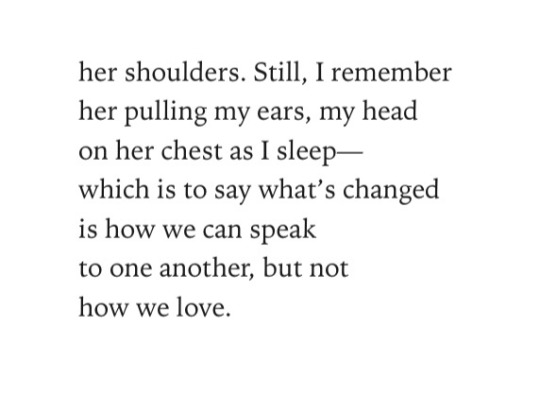
Stephanie Choi
#alliwanttodoiscollectpoetry#poem#poetry#poems#poet#poets#anthology#tumblr poetry#poem of the day#poetry blog#Stephanie choi#the lengest neoi#everything#everywhere#all at once#everything everywhere all at once#grandmother#poemblr#poetblr#literature#book worm#Chinese#Chinese American#immigrant#family#poems on identity
12 notes
·
View notes
Text
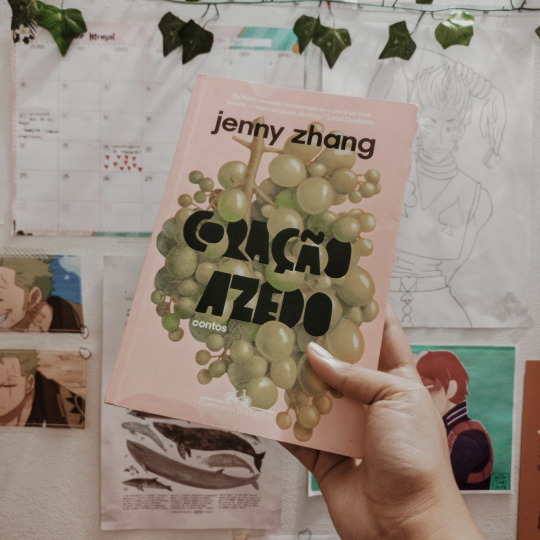
Sour Heart is a collection of short stories that portray the experiences of several Chinese immigrant families in the United States. From my point of view, Jenny Zhang made an exquisite choice of title, because throughout the book, the stories have sour, jaw-locking undertones.
The first tale is told from the perspective of a child who has been dragged into all that confusion without having choice. Christina tells about the different precarious properties she has lived in, about hunger, about the illicit ways her parents found to survive in the country of freedom. The girl presents the apartment they shared with about 10 other people, all sleeping together in the living room and that is the thread that connects all the other stories: all the stories in the book involve people who passed through this apartment. There are passages from other characters who mention Christina, without even having to use her name.
Although I found all this genius, still the violence and cruelty described in the book made me uncomfortable, not giving me such a good experience; but overall, an incredible book that helps us understand the reality of immigrants in the United States, described by someone who has been in this situation.
#books#books and reading#book recommendations#bookstan#books and literature#livros#booktok#books & libraries#book blog#bookshelf#sour heart#jenny zhang#chinese literature#american literature
9 notes
·
View notes
Text

– Ann Liang, If You Could See the Sun
#book quote of the day#ann liang#if you could see the sun#fantasy books#ya#young adult fiction#magical realism#Asian literature#boarding school#Asian author#dark academia aesthetic#rivals to lovers#Chinese American protagonist#books and reading#spilled ink
42 notes
·
View notes
Quote
If beauty signaled so much power, why did four out of four historical beauties die tragically?
Sally Wen Mao, “The Romance of the Castle-Toppler”
#the offing#feature#sally wen mao#poetry#poem#excerpt#quote#chinese history#chinese literature#asian american heritage month#apahm#aapi#aapihm#aapiheritagemonth
15 notes
·
View notes
Quote
For my entire life I longed for love. I knew it was not right for me — as a girl and later as a woman — to want or expect it, but I did, and this unjustified desire has been at the root of every problem I have experienced in my life.
Lisa See, excerpt from Snow Flower and the Secret Fan
60 notes
·
View notes
Quote
By the time I was forty, the rigidity of my footbinding had moved from my golden lilies to my heart, which held on to injustices and grievances so strongly that I could no longer forgive those I loved and who loved me.
Lisa See, Snow Flower and the Secret Fan
9 notes
·
View notes
Text
A Magic Steeped In Poison Book Review
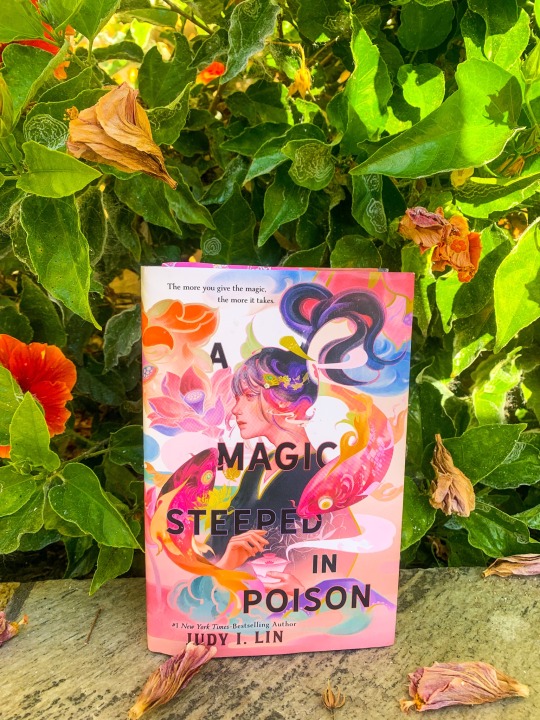
A Magic Steeped in Poison Book Review by Judy I. Lin
I’ll start by saying that this book cover is gorgeous. The colors, symbols, and how they all intertwine is incredibly well done and enticing to the eye. It was one of the main things that drew me to this novel.
Then I read the synopsis and learned this was a Frozen-esque sister tale of love and adventure involving the intricate process of tea-making. I was sold.
As a self-proclaimed boba connoisseur, luring me in with tea was an easy thing to do.
Unfortunately, it went downhill from there.
A Magic Steeped in Poison by Judy I. Lin is a story about a girl named Ning who wants to save her sister after she’s been poisoned. Several other people from different communities in the kingdom have also been poisoned from an anonymous criminal using tea bricks.
Ning will stop at nothing to save her sister, especially after their mother succumbed to the same fate. Ning holds herself responsible for not noticing or sensing the poison in the cup before handing it to her mother, which led to her demise.
In a Mulan-like move, Ning steals the scroll destined for her mother and accepts the invitation to the Palace in the capital in order to participate in a competition involving the best of the best shennong-shi, masters of the ancient art of tea-making.
Now that I’m writing all of this, the novel seemed unique and original to me at first, but other than the tea and the terminology, it’s a very conventional story of a peasant girl going to the capital to compete in a competition (which we’ve all seen a million times before).
Most recently for me, the same recycled plot was used in Throne of Glass by Sarah J. Maas.
While competing and living in the capital, Ning meets a variety of people, including Princess Zhen, fellow-competitor Lian, a variety of the servants and kitchen staff, and most importantly, the son of the legendary Banished Prince, Kang.
As her feelings for Kang grows, Ning also starts to uncover the dark intricacies unraveling in the kingdom, the corruption at court, and new friendships, all the while searching for the antidote to save her sister Shu.
Now, all of that sounds amazing. Lin has the components of a really great novel, but the execution is poorly done.
Lin tries to make the setting grand and unique, but it only comes across as confusing. She throws so much terminology at you that it’s impossible to keep track of all the places and landmarks she mentions (and genuinely they’re unimportant anyway). Unless you’re frequently checking the glossary in the back, you will be confused.
With an unimportant kingdom as the backdrop, most readers will fall back on the premise. Again, it sounds interesting but the execution is once again lacking.
The most intriguing part is the competition. Unfortunately, we don’t get to see a lot of it. Most of the stages are interrupted from external sources like an attack on the princess or subterfuge. Lin wants us to believe that Ning is this incredible shennong-shi, but really she just seems lucky and sort of unbelievably talented for someone who lacks training and education.
Very quickly, the reader learns that the thick of the plot revolves around kingdom politics and honestly? It was very boring. I didn’t care about the warring parts of the kingdom and the different factions vying for the throne. I didn’t have enough information about either to be invested in what happened or who ruled.
Lin bit off more than she could chew. She throws so many names and cities at you and wants you to care about them, but as a reader, you don’t have the time or depth to do so.
The most disappointing part of the novel for me, as always, was the characterization.
Ning as a character was imbalanced and embodied the terrible writing style of show-not-tell. One moment she would be cowering at the foot of some official and the next she’s making some retort back to the princess without fear.
One page she’s full of self-loathing about coming from a peasant village and the next she's filled with injustice about how certain communities are treated.
She was inconsistent and aggravatingly talented without reason. She was also a good person in a very boring way. Towards the end of the book, she learns that someone betrayed her. Instead of being mad once she finds out, she says she doesn’t blame this person since they have a family to look out for.
Who is that altruistic??? Maybe later most people could come to that conclusion, but most human beings in the moment would feel betrayed and upset and that would be normal and realistic. Ning was too good to be real which worsened the story overall.
Princess Zhen was your very stereotypical princess who wants the best for her kingdom and Kang is the stereotypical banished prince-sort-of-boy, who also wants the best for his kingdom despite everything they’ve done to him.
The other characters don’t matter, which is a shame since Lin spends an inordinate amount of time explaining who they are and introducing them. All of them blend together and none of them have enough of their own personalities to make them significant in any kind of way.
The romance between Kang and Ning is forced and while the burgeoning bud of it had promise, Lin wants you to believe that they have deep feelings for one another and a very strong connection despite meeting…three or four times for a handful of hours? People on the tv show the Bachelor spend more time together than that.
I didn’t mind the romance, but it lacked depth and evolution. It wasn’t believable in any kind of way that Ning would feel as strongly as she did after the short amount of time they spent together.
Lastly, the final nail in the coffin was overselling Ning. Lin makes you think that she’s crucial to the story and she’s really, really not.
The Princess thinks she’s amazing, Kang thinks she’s amazing, the court officials eventually think she’s important enough to keep an eye on, but nothing I saw reflected that.
It boiled down to Lin saying, hey, this character is super important because. Yeah. That’s why. In the plot itself, however, Ning didn’t matter as much as she was portrayed being.
Lin’s writing was also…distracting. She started so many sentences with “I” and her syntax read as repetitive and formal. Once I realized this, it was hard not to see it.
The highlights of this book were the Chinese influences on the setting, characters, and world-building. It’s always amazing when an author can draw on their experiences and Lin certainly did this. I just wish she did it better.
Disappointment was what I was left with after finishing this book. It started off okay and continually became more droll and unconvincing as the pages went on. For a book with such cool aspects and a glorious cover, the contents were a let down.
Recommendation: Gah. Admire the beautiful cover, go get some boba, and call it a day. If you’re truly obsessed with a lower-class girl traveling to a palace to take part in a competition and you’re also craving the Chinese influences, I’d recommend Girls of Paper and Fire by Natasha Ngan.
Just the first one. You don’t need to read the rest of the trilogy, believe me. Otherwise, a slew of competition-centered books exist that are way, way better.
Score: 5/10
#a magic steeped in poison#judy i lin#ya fiction#YA Books#YA literature#book blog#book review#favorite books#top books#Chinese American#5/10#Book Recommendations#book rec#YA Book Review
17 notes
·
View notes
Text
“What’s it like?” Lydia hesitated. Sometimes you almost forgot: that you didn’t look like everyone else. In homeroom or at the drugstore or at the supermarket, you listened to morning announcements or dropped off a roll of film or picked out a carton of eggs and felt like just another someone in the crowd. Sometimes you didn’t think about it at all. And then sometimes you noticed the girl across the aisle watching, the pharmacist watching, the checkout boy watching, and you saw yourself reflected in their stares: incongruous. Catching the eye like a hook. Every time you saw yourself from the outside, the way other people saw you, you remembered all over again. You saw it in the sign at the Peking Express—a cartoon man with a coolie hat, slant eyes, buckteeth, and chopsticks. You saw it in the little boys on the playground, stretching their eyes to slits with their fingers—Chinese—Japanese—look at these—and in the older boys who muttered ching chong ching chong ching as they passed you on the street, just loud enough for you to hear. You saw it when waitresses and policemen and bus drivers spoke slowly to you, in simple words, as if you might not understand. You saw it in photos, yours the only black head of hair in the scene, as if you’d been cut out and pasted in. You thought: Wait, what’s she doing there? And then you remembered that she was you. You kept your head down and thought about school, or space, or the future, and tried to forget about it. And you did, until it happened again.
Celeste Ng, Everything I Never Told You
#literature#american literature#novel#chinese american#asian american#Asian American fiction#asian american literature#everything i never told you
16 notes
·
View notes
Text
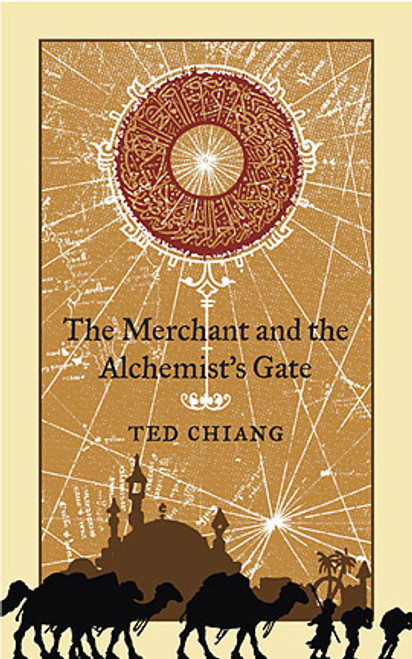
#novella#novellas#the merchant and the alchemist's gate#ted chiang#english language literature#american literature#asian american literature#chinese american literature#21st century fiction#completed polls#book polls#have you read this short fiction?
11 notes
·
View notes
Text
"Some scars are carved into our bones--a part of who we are, shaping what we become."
Sue Lynn Tan, Daughter of the Moon Goddess
#Sue Lynn Tan#Daughter of the Moon Goddess#scars#identity#character#bones#Chinese literature#Asian American literature#BIPOC author#quotes#quotes blog#literary quotes#literature quotes#literature#book quotes#books#words#text
5 notes
·
View notes
Text
The Language of Worldbuilding: It’s All Dystopian Baseball to Me + Review of Jen Gish's 'The Resisters'"
“Do you know what trauma is? she would ask. Doyou know how it can change people? And, You have toask, Who what when where how why. Starting withwho did this—the old Ondi or the new? But Gwen wouldjust say, over and over, You don’t understand”
The Resisters
Maybe it’s the anthropologist in me, or the countless hours of literary theory upon which professors drilled my peers and I through critical…

View On WordPress
#Alternative futures#American culture in sci-fi#Authoritarianism in East Asia#Baseball in sci-fi#Bleak circumstances in sci-fi#Censorship in East Asia#Chinese culture#Chinese sci-fi#Creating change in sci-fi#Critiquing societal norms in sci-fi#Cultural values in sci-fi#Dystopian novels#East Asian literature#East Asian sci-fi authors#Enlightening sci-fi#Filial piety in sci-fi#Future possibilities in sci-fi#Government control#Hope in dystopian novels#Imaginative storytelling#Inspiration in sci-fi#Jen Gish#Opposing oppressive systems in sci-fi#Oppression in sci-fi#Political themes in sci-fi#Power of individual agency#Powerful themes in sci-fi#Resistance in sci-fi#Science fiction in East Asia#Social and political critique
3 notes
·
View notes
Photo
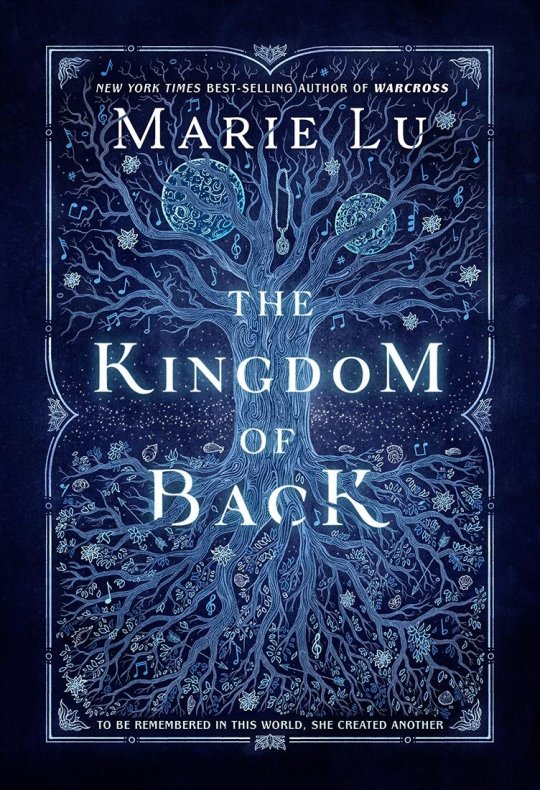
David Curtis’s illustrated book cover for Marie Lu’s The Kingdom of Back.
6 notes
·
View notes
Text

Book 11 of 2022!
Everything I Never Told You by Celeste Ng
⭐️⭐️⭐️
This begins with a Chinese-American family living in a small town in Ohio during the 1970’s. Lydia is the favourite child of Marilyn and James Lee, and her parents are determined she will achieve the dreams they were unable to pursue. When Lydia’s body is discovered in the local lake, the careful and delicate balance the family had been up-keeping fell apart and tumbled them into chaos.
Content Warnings: racism, child death, death, suicide, infidelity
What Did I Think?
This book both felt amazing and fell flat for me at the same time. Celeste Ng has an amazing talent and her book, Little Fires Everywhere, is the one I read before this one and thought the writing was incredible and the dialogue and dynamics was so complex and well done. I thought very similar for this one, except the writing in this one was much slower and harder to get into. It just didn’t flow very well in my opinion.
I did enjoy the multiple POV’s and the changing of timelines. That normally confuses me but not this time! Learning about the complex ways their family functions and how they have to try and fit in places none of them really fit in to, both inside and outside of the family, was fascinating and sad.
It was devastating and evoked a strong emotional reaction for me. The only thing that really let it down was the flow and pacing of the story.
Prompts:
Popsugar - “A Book Whose Title Begins with the Last Letter of Your Previous Read”
52 Book Club Challenge - “An Authors Photo on the Back Cover”
#popsugarreadingchallenge#52 book club challenge 2022#52 book club challenge#52 book club#52 books#celeste ng#little fires everywhere#everything i never told you#chinese american books#1970#literature#lit#books books books#bookstagram#bookish#book review#booklr#currently reading#reading
2 notes
·
View notes